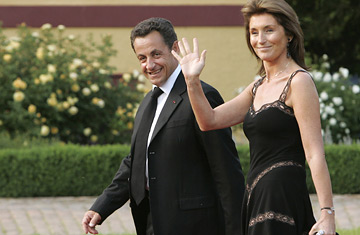
France's President Nicolas Sarkozy (L) and his wife Cecilia
The news in France was dominated Thursday by two developments that were as widely expected as they were painstakingly choreographed: The country's unions staged massive, nationwide strikes, and the Elysée announced the eventual divorce of President Nicolas Sarkozy and his wife, Cécilia. Clearly, no one in the country felt much like getting along.
The most significant of the two developments came as unions representing French public service workers fulfilled threats to bring transportation across the nation to a crawl on Thursday, with strikes protesting proposed tightening of pension schemes. The action forced millions of French commuters to drive, cycle, walk, or roller-blade to work as public transport systems in nearly 30 French cities were hit by strikes of varying severity. Such self-reliance wasn't an option for users of inter-city and cross-country train service: state rail company SNCF canceled a whopping 95% of scheduled traffic, and remains the most vulnerable to continued striking as union members prepared to vote on whether to renew the movement. The union leaders' task now is to find a way to extend the actions long enough to force Sarkozy to do something he's repeatedly vowed not to: withdraw contested reform he and conservative backers call both urgent and overdue. For many observers, the stage is set for a repeat of 1995, when the conservative government shelving proposed pension reform after a month of bitter, economically damaging strikes. The conservatives were voted out of power just 18 months later.
Despite the enormous stakes involved, Sarkozy himself had other matters to deal with as his fellow citizens hoofed it to work. Shortly after noon, the Elysée announced "separation by mutual consent" of the Sarkozys — a split of their often high-profile but troubled marriage that had been widely expected. Indeed, over the past week, journalists' primary question to the Elysée had shifted from if the Sarkozys would be splitting to when their parting would be finally announced.
Many French people have adopted the traditional Gallic shrug toward striking public service workers who have left them stranded. "You can't blame them for protecting their perks. No want wants entitlements taken away," said university student Anne Gautier, 22, as she walked away from a crowded Metro station to walk to classes. But not all Parisians were pounding the pavement with the same sympathetic mood. "As usual, the ordinary worker being taken hostage by a minority of people who've decided they come first," complains an accountant who would only give her first name, Chantal. "I didn't strike when they reformed my pension plan," she said, referring to private sector pension schemes was passed in 2003.
The reforms the transport unions are opposing includes extending the time required to have worked on a job to qualify for a full pension from 37.5 years to 40. That would largely bring public sector pension requisites into line with those governing the private sector. Unions, however, note that even the accords signed in 2003 are up for review next spring, and many expect the private sector time requirements will lengthen further.
The government and its backers say they'll do whatever necessary to make France's overburdened, underfinanced pension system viable. Some observers worry that the polarizing split within French society that a drawn-out conflict would result in makes reaching compromise over pension reform critical.
